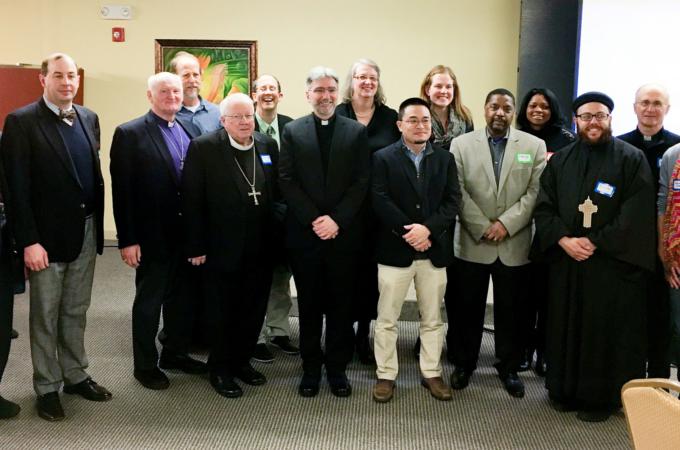Spiritual ecumenism
In late January the annual Week of Prayer for Christian Unity was observed around the world. Last year in Boston there was a prayer service each night of that week in a different denominational church, and members of all churches were invited to come and join their hearts and voices in prayer.
A different approach was taken this year: to invite congregations in different parts of the city to host a meal together where Christians from different traditions could get to know one another better and share stories of faith. These fellowship dinners invited conversation on how God's powerful hand is working to overcome divisions between our congregations and within our neighborhoods.
The fellowship dinners took place in Boston, the South End, Cambridge, Jamaica Plain, Revere, Medford, and Dorchester. These events were organized and promoted by UniteBoston, a relatively new organization that seeks to pursue reconciliation among all Christians in Boston through shared experiences which lead to relationships and better mutual understanding.
This Week of Prayer itself was originally initiated by Father Paul Wattson in 1908 as a Church Unity Octave. Father Paul founded the Society of the Atonement at Graymoor, Garrison, New York, with the mission of promoting Christian unity. He believed that an annual time set aside for prayer and seminars would advance the cause and deepen people's understanding of the ecumenical movement.
A huge advance in deepening that understanding within the Catholic Church was the 1962-65 Second Vatican Council. One of the two reasons offered by Pope John XXIII in convoking it was the promotion of Christian unity. In the Council's landmark Decree on Ecumenism, the world assembly of bishops gave priority of place to prayer: "Spiritual ecumenism should be regarded as the soul of the whole ecumenical movement." They defined it as "change of heart and holiness of life" as well as "public and private prayer for the unity of Christians" (Decree on Ecumenism, 8).
Cardinal Walter Kasper, who directed for several years the work of the Vatican Secretariat for the Promotion of Christian Unity, identified various other expressions of spiritual ecumenism as well: the shared reading and meditation of sacred scripture; exchanges between monasteries, communities and spirituality movements; visits to pilgrim sites and centers of spirituality.
He also saw as one of the most encouraging signs the creation of ecumenical monasteries like Taize (France), Grandchamp (Switzerland), and Bose (Italy); international lay movements and institutes of consecrated life like Focolare, the Community of Sant'Egidio, and the l'Arche Federation.
When John Paul II told the College of Cardinals in a state-of-the-Church address "I pray every day for Christian unity," I couldn't help but wonder how many Christians could say as much. Imagine what a different Church it would be if many members in all the churches that make up the one Church of Christ could say the same.
It would make a difference because prayer's first effect is in us. Our own hearts and minds would be shaped by our own prayer and become more sensitive to the opportunities we have to translate that prayer into practice. Prayer is and will always hold the first place in unity efforts because it is prayer that most changes our hearts, and it is our hearts that most need to be changed.
That said, as we noted, spiritual ecumenism encompasses more than simply prayer for unity. It is also an exchange of spiritual gifts -- contemplative and charismatic ways of praying, lectio divina, devotional practices, the theology of icons, the tradition of spiritual direction, effective approaches to youth and young adults, the practice of annual retreats and monthly desert days, methods of singing, preaching, and yes, sharing the faith over meals.
Spiritual ecumenism must seek out and serve life. It must be concerned with everyday human experiences as well as with the great questions of justice and peace and the preservation of creation. Through the prayer, sharing, and ministerial engagement our hearts are turned more fully toward Christ, and the closer we come to him, the more we discover ourselves in unity. And in the exchange of spiritual gifts, what is lacking in each of our traditions finds its needed complement.
In what form of spiritual ecumenism might it be possible for you to engage in the year ahead?
- Father Thomas Ryan, CSP, directs the Paulist North American Office for Ecumenical and Interfaith Relations in Boston.



















